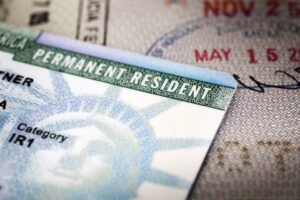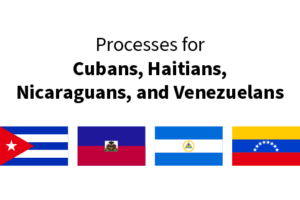Get Your Green Card
A person who entered the country legally and has remained in good legal standing may be eligible to obtain their Green Card through an adjustment of status. An adjustment of status is a process in which a person may obtain a green card without leaving the country. The process usually involves acquiring an Employment Authorization Document so an individual is permitted to work legally in the United States. It may also include a travel permit, also known as an “advance parole.”
Nassim Arzani, Esq. has years of experience in immigration cases. She knows how to help individuals and families achieve the legal status they need to work and move freely about the United State without fear of being detained. To learn how Nassim can assist you in obtaining a green card, please contact us online or call (951) 683-0900.

Obtaining a Green Card
Immigrants who have obtained a Green Card are granted permanent residence in the United States. There are several means of obtaining a green card, including sponsorship through an employer or by a close relative already living in the USA. Displaced people may also acquire permanent residence if the Federal Government has offered them asylum.
Permanent Residence is a legal status that comes with many benefits, including a pathway to citizenship. For many immigrants seeking a safe and stable home, obtaining a Green Card is when their American dream can begin in earnest.
Family Based Immigration
Family immigration law pertains to the bond that unites a legal resident of the United States and a loved one that they want to bring into the country.
The person already living in America is known as the petitioner, since they are actively petitioning for the inclusion of their family member to join them in the country. The individual seeking residency referred to as the beneficiary.
In order to qualify for a Green Card, the petitioner must be able to prove that she or he can provide enough financial stability to support the beneficiary. Specifically, the petitioner must earn at least 125% of the Poverty Guidelines in their state, as defined by the Department of Health and Human Services (HHS). Active members of the U.S. military only need to show proof that they earn 100% or more of these Poverty Guidelines. If the petitioner is requesting more than one beneficiary to join them in the United States, then the petitioner must add $4,480 for each additional beneficiary.
Adjustment of Status
INA § 245(a) allows those who entered the United States with inspection to adjust status if they are either an immediate relative or are in one of the family-based preference categories and have always maintained lawful immigration status, including always working with employment authorization. INA § 245(i) allows for the adjustment of those who entered without inspection as long as an approvable petition (I-130, I-360, I-526, or labor certification) was filed on behalf of them on or before April 30, 2001, and they were physically present in the United States on December 21, 2000. This physical presence requirement is waived for those whose petition was filed on or before January 14, 1998 or who are derivative beneficiaries.
Consular Processing
If you are seeking Permanent Residency U.S. citizenship while living in another nation, you may find the resources you need at your local consulate. Consular processing is the term that describes the procedure in which visa applicants submit paperwork and attend hearings in their origin country.
Consulates may coordinate with the U.S. Citizenship and Immigration Services (USCIS) to process the necessary visa packets and ultimately issue a Green Card.




